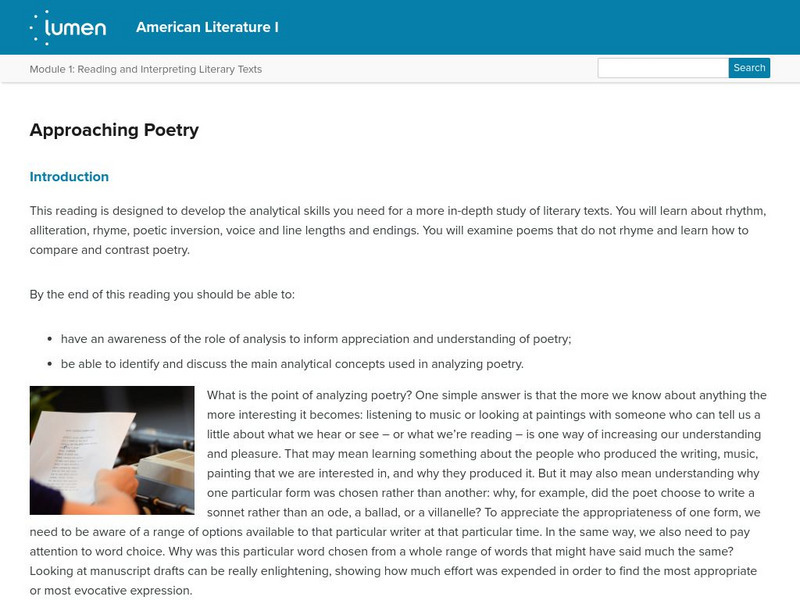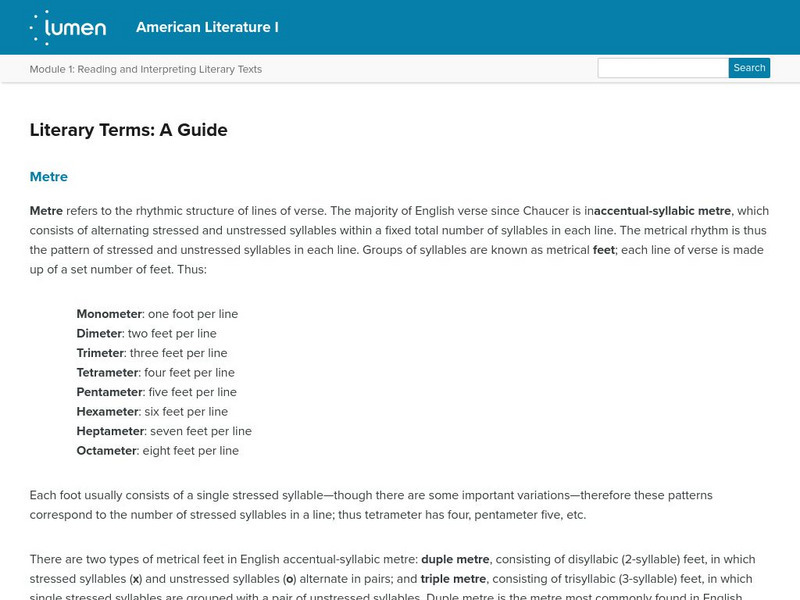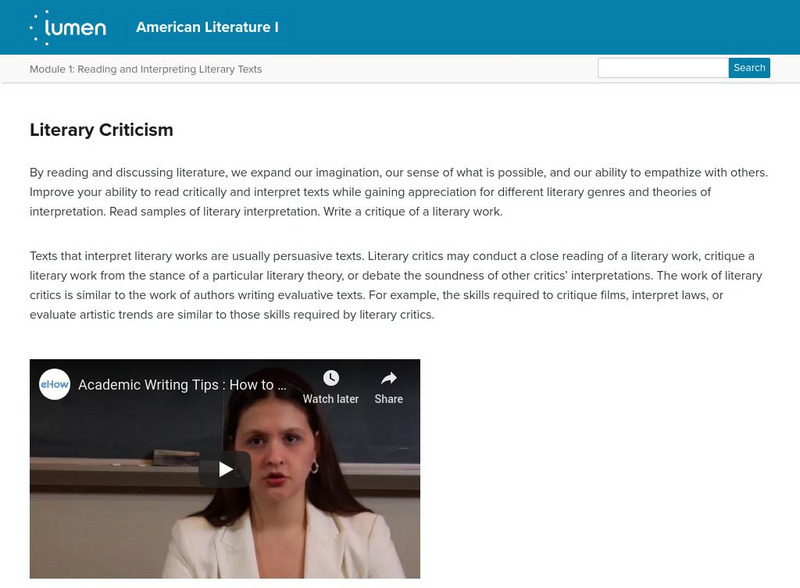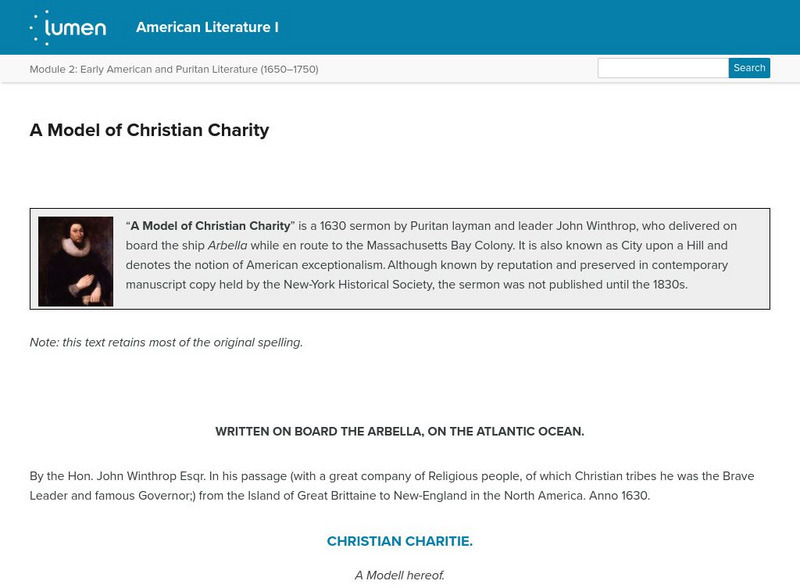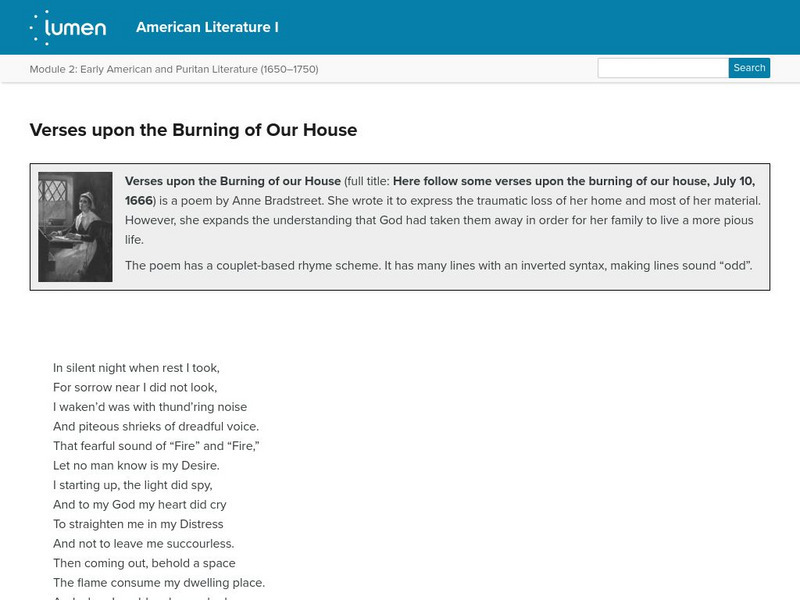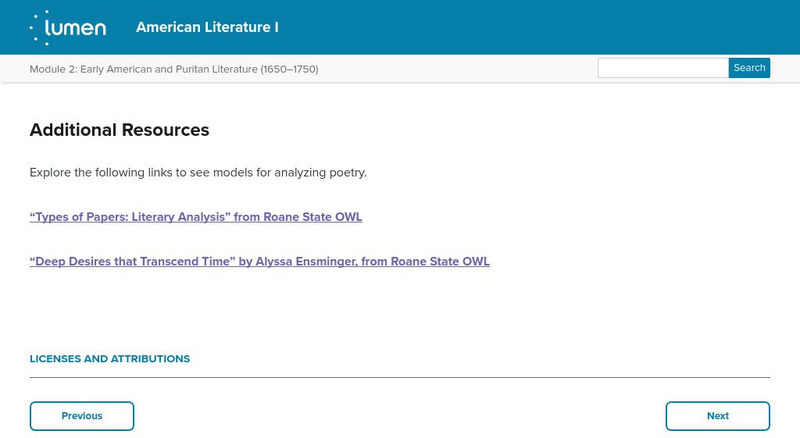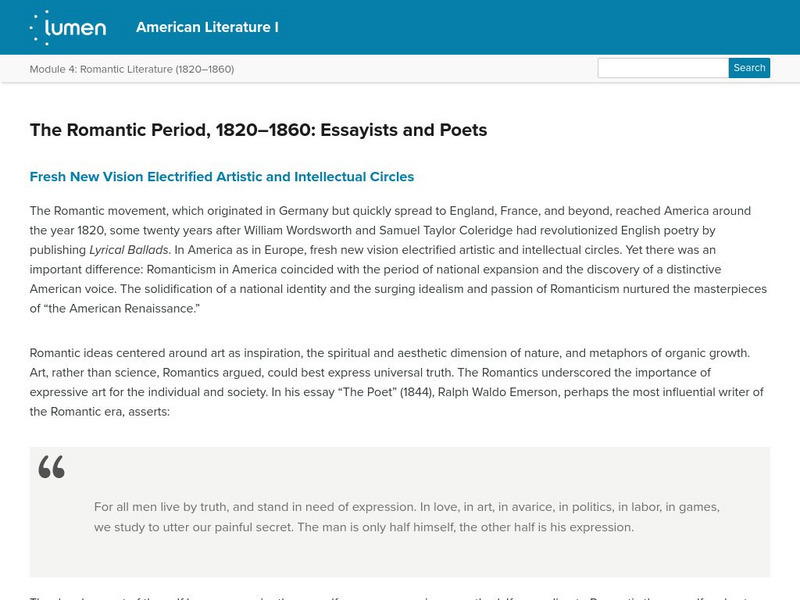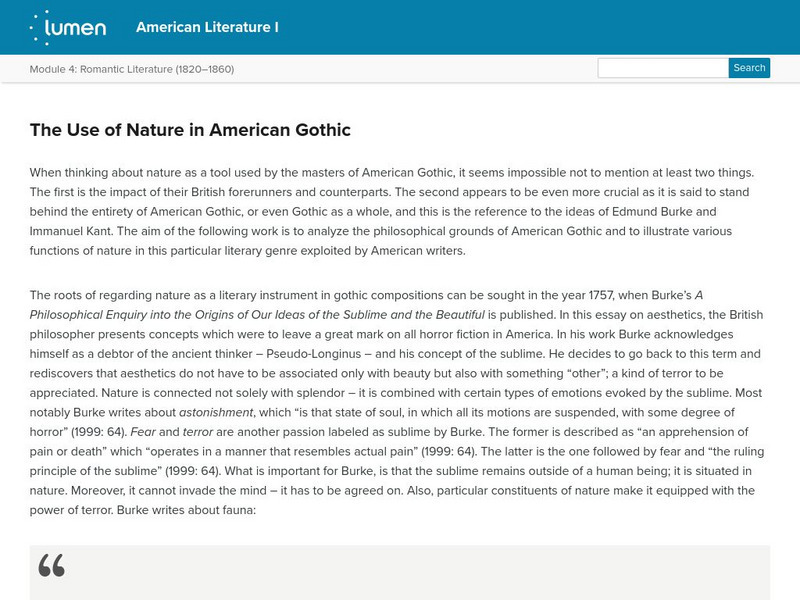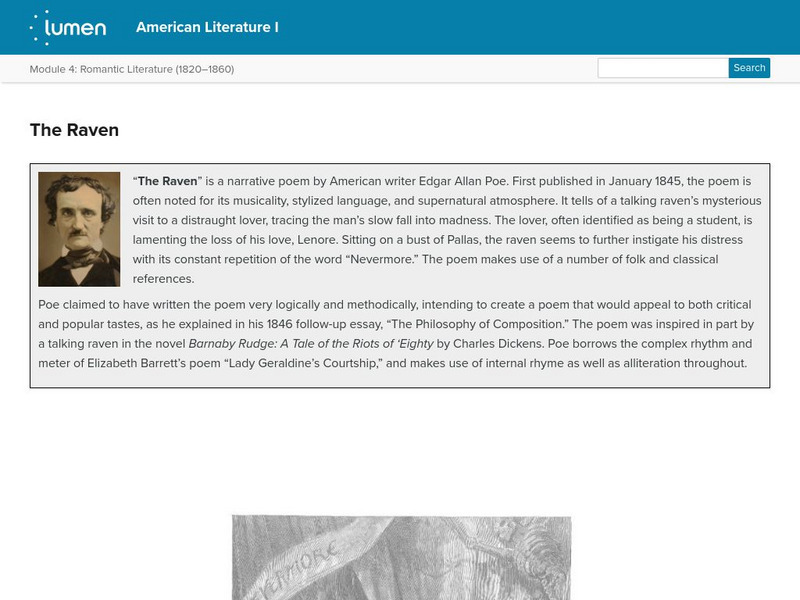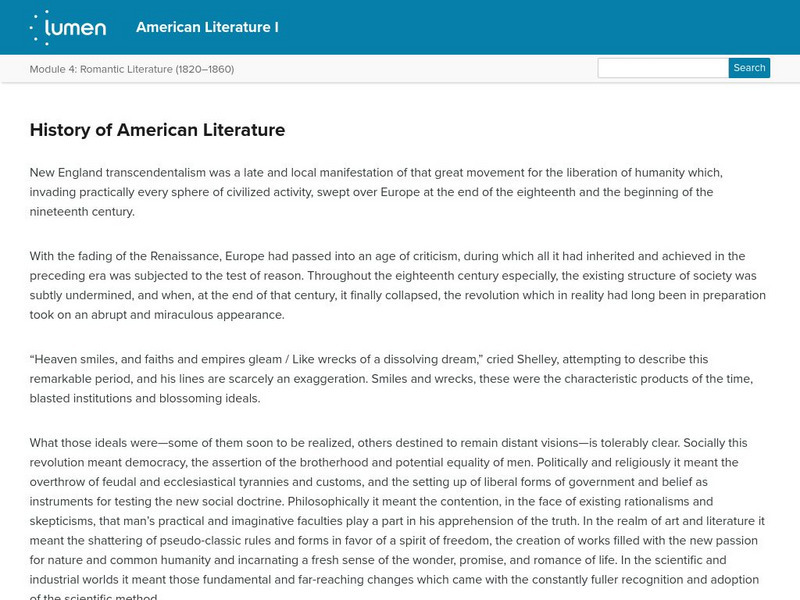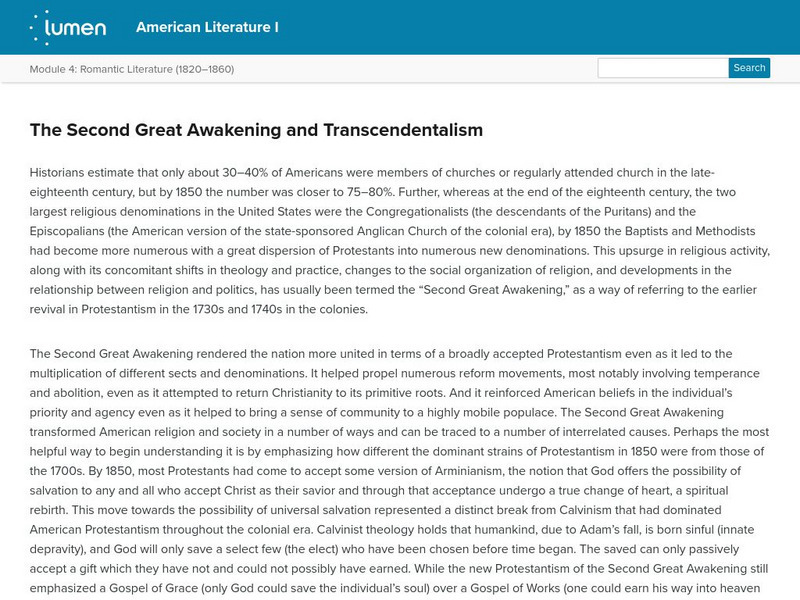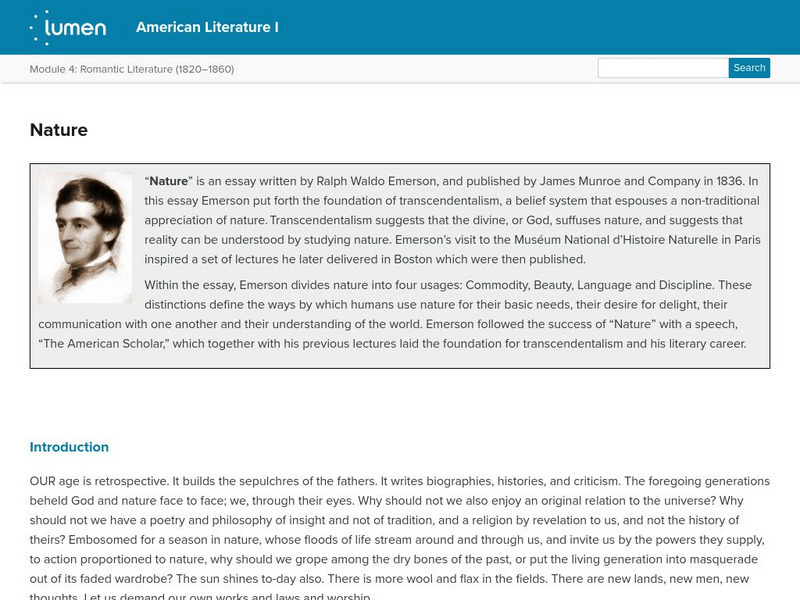Lumen Learning
Lumen: A Short History of the Early American Novel
This article is a brief history of the Early American novel with citations.
Lumen Learning
Lumen: Reading and Interpreting Literary Texts: Approaching Poetry
This instructional activity focuses on the how to approach the analysis of poetry. It provides a series of student activities such as having students read and compare a draft and the final version of William Blake's "Tyger" which is...
Lumen Learning
Lumen: Reading and Interpreting Literary Texts: Literary Terms: A Guide
This is a guide to poetic literary terms such as meter and an explanation of several types of meter, types of stanzas, types of rhyme, etc.
Lumen Learning
Lumen: Reading and Interpreting Literary Texts: Literary Criticism
This lesson focuses on how to write a literary criticism, the different theories and approaches to literary criticism, and their standard format.
Lumen Learning
Lumen: Early American and Puritan Literature: "A Model of Christian Charity"
"A Model of Christian Charity" is a 1630 sermon by Puritan layman and leader John Winthrop, who delivered on board the ship Arbella while en route to the Massachusetts Bay Colony. It is also known as City upon a Hill and denotes the...
Lumen Learning
Lumen: American and Puritan Literature: Sinners in the Hands of an Angry God
"Sinners in the Hands of an Angry God" is a sermon written by British Colonial Christian theologian Jonathan Edwards, preached to his own congregation in Northampton, Massachusetts to an unknown effect, and again on July 8, 1741, in...
Lumen Learning
Lumen: Early American and Puritan Literature: The Pilgrim's Progress
The Pilgrim's Progress from This World to That Which Is to Come; Delivered under the Similitude of a Dream is a Christian allegory written by John Bunyan (1628-1688) and published in February 1678. It is regarded as one of the most...
Lumen Learning
Lumen: Early American Literature: "Verses Upon the Burning of Our House"
"Verses upon the Burning of our House" (July 10, 1666) is a poem by Anne Bradstreet. She wrote it to express the traumatic loss of her home and most of her material. However, she expands the understanding that God had taken them away in...
Lumen Learning
Lumen: Models for Literary Analysis
Explore these links to see models for literary analysis including a model analysis of poetry. "Types of Papers: Literary Analysis" from Roane State OWL and "Deep Desires that Transcend Time" by Alyssa Ensminger, from Roane State OWL....
Lumen Learning
Lumen: Enlightenment: "Give Me Liberty, or Give Me Death!" by Patrick Henry
Use the video and text of "Give me liberty, or give me death!" a quotation by Patrick Henry from a speech he made to the Virginia Convention in 1775, at St. John's Church in Richmond, Virginia, to consider the two learning outcomes...
Lumen Learning
Lumen: Enlightenment: Autobiography of Benjamin Franklin
Use the text or audio of Autobiography of Benjamin Franklin to consider the two learning outcomes below. Describe the major historical and cultural developments of the Enlightenment; explain key concepts. Describe the major conventions,...
Lumen Learning
Lumen: American Literature: Introduction to Romantic Literature
This introduction to Romantic literature focuses on the learning outcomes of the study of various pieces of American Romantic literature. These include describe the major historical and cultural developments of the Romantic period,...
Lumen Learning
Lumen: The Romantic Period, 1820 1860: Essayists and Poets
This lesson focuses on the Romantic Period's essayists and poets such as Ralph Waldo Emerson, Henry David Thoreau, Henry Wadsworth Longfellow, Emily Dickinson, Walt Whitman, the Brahmin Poets, and more.
Lumen Learning
Lumen: American Literature: "Thanatopsis" by William Cullen Bryant
Use the text and the video "Thanatopsis" by William Cullen Bryant to identify and understand the characteristics of American Romanticism.
Lumen Learning
Lumen: American Literature: "Wakefield" by Nathaniel Hawthorne
Use the text excerpt and video "Wakefield" by Nathaniel Hawthorne to identify and understand the characteristics of American Romanticism.
Lumen Learning
Lumen: American Romanticism: "Song of Myself" by Walt Whitman
Use the text and video excerpt of "Song of Myself" by Walt Whitman to identify and understand the characteristics of American Romanticism. "Song of Myself" is a poem by Walt Whitman that is included in his work Leaves of Grass. It has...
Lumen Learning
Lumen: American Romanticism: The Use of Nature in American Gothic
This article "The Use of Nature in American Gothic" focuses on how nature is used in American Gothic literature.
Lumen Learning
Lumen: American Romanticism: The Indian Burying Ground by Philip Morin Freneau
This is the text and video reading of the poem "The Indian Burying Ground" by Philip Morin Freneau, an American poet, nationalist (also known as Federalist), polemicist, sea captain, and newspaper editor sometimes called the "Poet of the...
Lumen Learning
Lumen: American Romanticism: The Legend of Sleepy Hollow by Washington Irving
This is an excerpt of the text and an audio book of the full text of the novella The Legend of Sleepy Hollow by Washington Irving
Lumen Learning
Lumen: American Romanticism: "The Raven" by Edgar Allan Poe
This is the text and audio of the poem "The Raven" by Edgar Allan Poe, a narrative poem first published in January 1845, and is often noted for its musicality, stylized language, and supernatural atmosphere.
Lumen Learning
Lumen: History of American Literature
This article features a brief history of American literature.
Lumen Learning
Lumen: The Second Great Awakening and Transcendentalism
This article focuses on the Second Great Awakening and Transcendentalism in America. It looks at the relationship between religion and politics.
Lumen Learning
Lumen: American Romanticism: "Nature" by Ralph Waldo Emerson
This is the text of the essay "Nature" by Ralph Waldo Emerson, the foundation of transcendentalism, a belief system that espouses a non-traditional appreciation of nature. Transcendentalism suggests that the divine, or God, suffuses...
Lumen Learning
Lumen: Romanticism: "The American Scholar" by Ralph Waldo Emerson
"The American Scholar" is a speech given by Ralph Waldo Emerson on August 31, 1837, to the Phi Beta Kappa Society at Cambridge, Massachusetts. He was invited to speak in recognition of his groundbreaking work "Nature" in which he...



